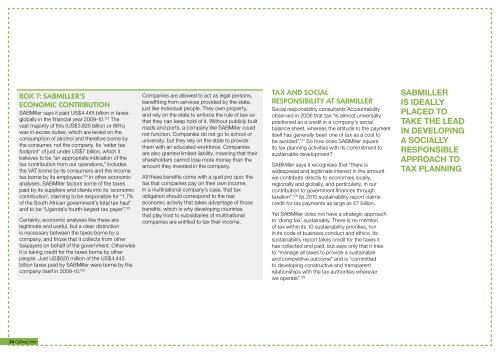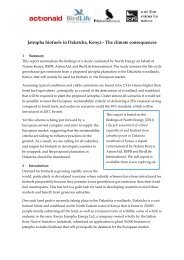Create successful ePaper yourself
Turn your PDF publications into a flip-book with our unique Google optimized e-Paper software.
Box 7: saBmiller’s<br />
economic contriBution<br />
SABMiller says it paid US$4.445 billion in taxes<br />
globally in the financial year 2009-10. 123 The<br />
vast majority of this (US$3.825 billion or 86%)<br />
was in excise duties, which are levied on the<br />
consumption of alcohol and therefore borne by<br />
the consumer, not the company. Its ‘wider tax<br />
footprint’ of just under US$7 billion, which it<br />
believes to be “an appropriate indication of the<br />
tax contribution from our operations,” includes<br />
the VAT borne by its consumers and the income<br />
tax borne by its employees. 124 In other economic<br />
analyses, SABMiller factors some of the taxes<br />
paid by its suppliers and clients into its ‘economic<br />
contribution’, claiming to be responsible for “1.7%<br />
of the South African government’s total tax haul”<br />
and to be “Uganda’s fourth-largest tax payer”. 125<br />
Certainly, economic analyses like these are<br />
legitimate and useful, but a clear distinction<br />
is necessary between the taxes borne by a<br />
company, and those that it collects from other<br />
taxpayers on behalf of the government. Otherwise<br />
it is taking credit for the taxes borne by other<br />
people. Just US$620 million of the US$4.445<br />
billion taxes paid by SABMiller were borne by the<br />
company itself in 2009-10. 126<br />
34 <strong>Calling</strong> time<br />
Companies are allowed to act as legal persons,<br />
benefitting from services provided by the state,<br />
just like individual people. They own property,<br />
and rely on the state to enforce the rule of law so<br />
that they can keep hold of it. Without publicly built<br />
roads and ports, a company like SABMiller could<br />
not function. Companies do not go to school or<br />
university, but they rely on the state to provide<br />
them with an educated workforce. Companies<br />
are also granted limited liability, meaning that their<br />
shareholders cannot lose more money than the<br />
amount they invested in the company.<br />
All these benefits come with a quid pro quo: the<br />
tax that companies pay on their own income.<br />
In a multinational company’s case, that tax<br />
obligation should correspond to the real<br />
economic activity that takes advantage of those<br />
benefits, which is why developing countries<br />
that play host to subsidiaries of multinational<br />
companies are entitled to tax their income.<br />
tax and social<br />
responsiBility at saBmiller<br />
Social responsibility consultants Accountability<br />
observed in 2006 that tax “is almost universally<br />
positioned as a credit in a company’s social<br />
balance sheet, whereas the attitude to the payment<br />
itself has generally been one of tax as a cost to<br />
be avoided”. 127 So how does SABMiller square<br />
its tax planning activities with its commitment to<br />
sustainable development?<br />
SABMiller says it recognises that “there is<br />
widespread and legitimate interest in the amount<br />
we contribute directly to economies locally,<br />
regionally and globally, and particularly, in our<br />
contribution to government finances through<br />
taxation”. 128 Its 2010 sustainability report claims<br />
credit for tax payments as large as £7 billion.<br />
Yet SABMiller does not have a strategic approach<br />
to ‘doing tax’ sustainably. There is no mention<br />
of tax within its 10 sustainability priorities, nor<br />
in its code of business conduct and ethics. Its<br />
sustainability report takes credit for the taxes it<br />
has collected and paid, but says only that it tries<br />
to “manage all taxes to provide a sustainable<br />
and competitive outcome” and is “committed<br />
to developing constructive and transparent<br />
relationships with the tax authorities wherever<br />
we operate”. 129<br />
SAbMIlleR<br />
IS IDeAlly<br />
PlACeD To<br />
TAke The leAD<br />
In DeveloPIng<br />
A SoCIAlly<br />
ReSPonSIble<br />
APPRoACh To<br />
TAx PlAnnIng

















